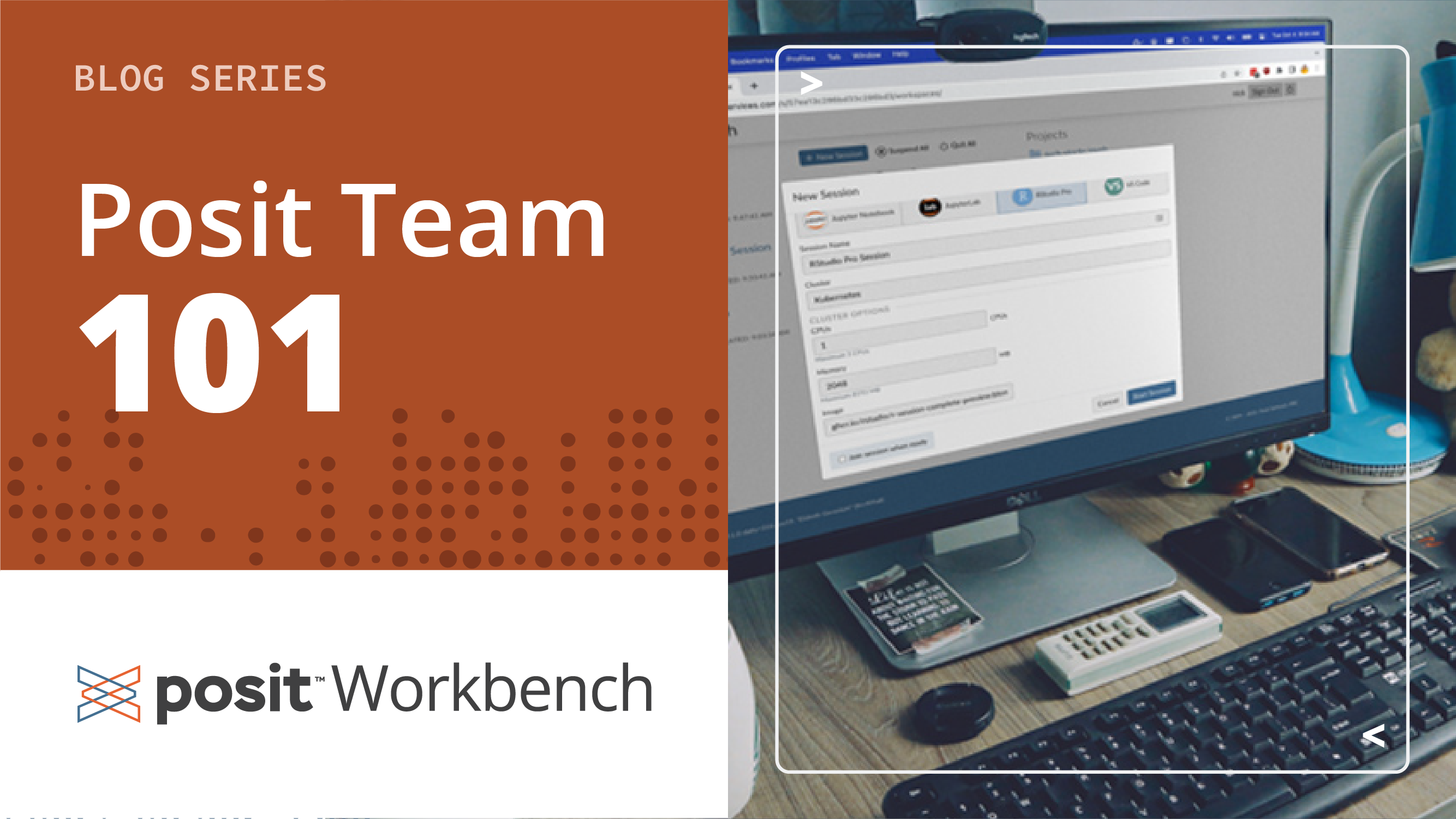Posit Workbench for Clinical Workflows

The pharmaceutical industry is a data-intensive field that relies on analytics and data science to drive innovation and improve patient outcomes. However, managing complex pharma workflows comes with unique challenges, such as keeping your environment secure, ensuring traceability, and promoting team collaboration and efficiency.
A robust development environment that balances access, compliance, collaboration, flexibility, and efficiency is essential for meeting the requirements of the pharmaceutical industry. At Posit, we understand these needs, which is why we created Posit Workbench.
Posit Workbench is a development environment designed to ensure secure access to coding tools, streamline the coding process, and improve collaboration among teams, all while increasing efficiency. By using Workbench, pharma companies can enhance their development capabilities and stay at the forefront of their industry.
Let’s dive into the essential features of any development environment to meet pharmaceutical industry demands.
1. Secure access
Pharmaceutical companies work with highly sensitive and confidential data, as well as proprietary research and code. However, data professionals must be able to share their work with the right people. Authentication and managing credentials are all essential to maintaining secure access to a development environment while letting data professionals do their work.
The MaineHealth Institute for Research found that when everybody worked on their desktop computers, it made it difficult to ensure they were meeting the high-security standards of the organization. It was unclear how packages were being downloaded and how data and code were being shared. Adopting the cloud-based Posit Workbench increased security by providing analysts access to a managed R environment.
All Posit Team products like Posit Workbench run entirely within your own server environment, giving you control over where and how data is accessed. R and Python users must log in to Workbench using their Single Sign-On (SSO), Active Directory (AD), or other credentials. They can share RStudio projects with their team members directly within the environment, avoiding the possibility of downloading or storing files inappropriately.
With Workbench, administrators and security teams have full control over the development environment and the ability to employ a variety of security features, including:
- Robust authentication via SSO (SAML, Open ID Connect), LDAP/AD, PAM, and more
- A firewall that only allows defined IP addresses to access Workbench
- Posit Professional Drivers for using secured credentials for database connections
- Linux file permissions that only permit activity within a user’s designated home directory
Administrators can also deploy separate, isolated Workbench instances to keep PI and PII data separate. Through narrow control of the development environment, data professionals in pharma can feel confident that their work will stay secure and only accessible to those who need it.
2. Compliance
Traceability and reproducibility are essential components of compliance in pharma. They enable auditors to verify that the data and code have not been tampered with and can be reproduced by an independent party. Posit Workbench offers features that assist with both, making it a valuable tool for pharma companies looking to comply with regulatory requirements.
One key compliance feature is Posit Workbench’s R session auditing, which captures all R console activity and records it in a central location. This allows anybody to review the exact steps executed during an R session.
Workbench offers many features that aid in the reproducibility of code. With default repositories, data professionals can access and use the same packages. Workbench’s integrated version control support helps teams manage source code changes over time. Additionally, Workbench supports environment management tools like R’s renv and Python’s venv, which document and manage package versions, allowing you to reproduce a specific project environment. If a team needs more control over the packages used in analyses, Posit Package Manager provides access to custom repositories, internal packages, and historic snapshots.
These are just a few features that help create data professionals meet regulatory requirements with Workbench. Satish Murthy from Janssen R&D describes how his team created a validated environment for reproducibility with Posit products:
3. Collaboration
Pharmaceutical projects are often a collaborative effort, and a data team must be able to work together. With many handoffs between individuals and teams, a development environment must facilitate collaboration for better communication, faster feedback, and improved team morale.
One of the key features of Posit Workbench is its integrated support for version control. Version control allows data professionals to review each other’s code, give feedback, and approve changes in a controlled fashion. It ensures that everybody works with the latest code and that changes are tracked and auditable.
So if you think about our work without Workbench it’s kind of like we’re in a silo. It’s really hard to share our work with others. Via [Posit Workbench] and Git we can move our work outside of a silo into a repository. And I can move other people’s work from the repositories into my Workbench.
– Lawrence Tello, Senior Clinical Informatics Specialist, California Department of Health
Another feature of Posit Workbench is RStudio Pro’s collaborative editing. With collaborative editing, users can access the same project simultaneously and edit the code together, promoting real-time collaboration and efficient workflows. The team can work together seamlessly and minimize handoffs.
4. Flexibility
As the pharmaceutical industry evolves and changes, the tools that data professionals adopt must be flexible to adapt to changing requirements. Tools must be flexible to meet the increasing demand for more people, more computing power, or bigger data.
As a development environment, Posit Workbench has the design and features needed to meet variable needs:
| Use Case | Problem | Solutions | Technology |
|---|---|---|---|
| Scaling for many R users | Regular R workflows for a team. Includes loading data subsets from files or warehouses | Create a platform to support large-scale individual interactive R session(s) and jobs | Posit Workbench + Load Balancer, Posit Workbench + Launcher |
| Scaling for high-performance computing | Parallel tasks like bootstrapping, cross-validation, scoring, model fitting on independent groups | Develop code in an interactive R session in RStudio Pro. Submit code via Workbench Jobs into a remote cluster. R must be installed on all compute nodes. |
Local: parallel, Rmpi, snow, Rcpp parallel; Cluster: Posit Workbench Jobs, Kubernetes, Slurm, LSF, Torque, Docker |
| Scaling for big data | Big data, black box routines that require fitting a model against an entire domain space. Data can’t fit on one machine. | R is an orchestration engine. Heavy lifting is done by a different compute engine on the cluster. R syntax is used to construct pipelines, and R is used to analyze results. | Spark, Tensorflow, Oracle BDA, Microsoft R Server, Hadoop, Aster, H2O.ai |
Posit Workbench is available as a fully-managed service through RStudio on Amazon SageMaker and Posit Workbench for Azure ML, allowing users to access cloud capabilities to access, develop, and analyze results. Fully-managed services provide a hands-off approach to cloud services, where the provider takes care of all the operational aspects of the infrastructure.
IDE and Programming Language Needs
The pharma industry is increasingly adopting open-source languages like R and Python, and their teams need the tools to support these languages, too. Posit Workbench allows data professionals programming in either R or Python to access the same server with a variety of their favorite IDEs, including RStudio Pro, VS Code, JupyterLab, and Jupyter Notebooks. Thanks to the centralization of Workbench, they can work together regardless of their language or IDE of choice.
5. Efficiency
In the pharmaceutical industry, time is of the essence. The ability to dive into data and quickly create insights can speed up the delivery of life-saving medicines to patients.
Posit Workbench optimizes efficiency for data professionals by helping them focus on data analysis instead of on software installation and management. Workbench enables tailored sessions for each user or group, freeing data professionals from worrying about installation, versioning, or resource allocation. They can work confidently in their environment, reducing the time to complete analyses.
Using shared infrastructure allows users to focus on data analysis instead of on software installation and management.
– Adam Black, Research Analyst, MaineHealth Institute for Research
Learn more
Posit Workbench offers a range of features that meet the needs of modern pharma data workflows. By adopting a centralized approach that emphasizes open source, pharmaceutical organizations can ensure their data teams have tools that are accessible, compliant, collaborative, flexible, and efficient.
Book a call with our pharma experts to learn more about how Posit Workbench meets your team’s development needs.
